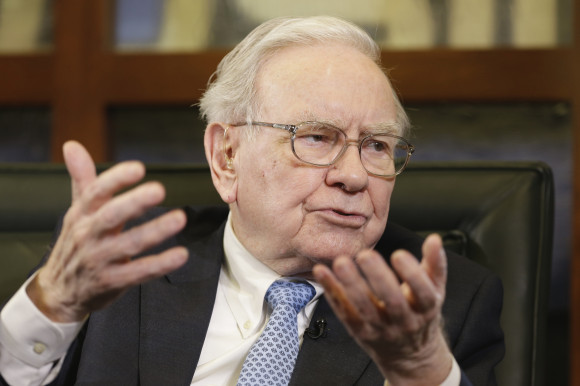Berkshire Hathaway Inc.’s annual shareholder meeting often features questions about the challenges and strategies of whoever succeeds Chief Executive Officer Warren Buffett. This year, investors got to see the likely candidates in action.
When confronted on a question about succession, Buffett pointed out that deputies Greg Abel and Ajit Jain were there and available to take questions. The pair ended up fielding multiple queries on energy investments and insurance.
Buffett, 88, and vice chairman Charlie Munger, 95, still grabbed the vast majority of the speaking time during the more than five hours of question and answers, and both gave no sense of wanting to step back from their roles in the sprawling conglomerate they’ve built. But the appearances offered shareholders a bit more familiarity with two executives that took direct oversight of the company’s primary operating units last year.
“The truth is Charlie and I are afraid of looking bad, those guys are better than we are,” Buffett told shareholders. “They know the businesses better, they work harder by far, and you are absolutely invited to ask questions to be directed over to them at this meeting.”
Abel, who runs all of Berkshire’s non-insurance operations, is seen as the more likely CEO successor because of his younger age and broader remit. Buffett has repeatedly said that Jain has probably made more money for shareholders than he has.
Buffett said Saturday investing deputies Ted Weschler and Todd Combs wouldn’t take questions as he doesn’t want the pair giving away any secret sauce. One shareholder directed a question to the pair and Buffett answered instead.
Here are some other takeaways from the company’s meeting and first-quarter results:
Kraft Heinz
Buffett received several questions on his stake in Kraft Heinz Co., which had to be excluded from Berkshire’s first-quarter earnings because Kraft Heinz still hasn’t filed its annual report for 2018 amid regulatory investigations.
Buffett said he and partners 3G Capital overpaid for Kraft Foods Group Inc. in its 2015 merger with H.J. Heinz, which Berkshire and 3G had bought two years earlier. The company is performing well operationally, but has faced stiffer competition from newer brands, he said. Buffett and Munger also defended 3G and said they could work with Brazilian private-equity firm again.
“It’s not a tragedy that out of two transactions one worked wonderfully, and the other didn’t work so well,” Munger said. “That happens.”
Read more: Berkshire gets new headache from Kraft Heinz
Tech Investments
Buffett has historically shunned investing in technology companies, but with the world’s five most valuable corporations now hailing from that sector, the billionaire was asked whether that should change.
He and Munger expressed regret that they missed several stocks that exploded in value, including Google. Munger offered that perhaps the company’s recent investment in Apple Inc., which has yielded more than $10 billion in gains, atones for some of the missed opportunities.
Buffett said several tech companies, including Amazon, could be evaluated in a way that wasn’t too far from the value investing framework he’s long espoused. But he said he wouldn’t be drawn into investing in businesses he didn’t understand and wouldn’t add teams of managers to be specialists in different industries.
Earnings Growth
Operating profit rose 5 percent in the quarter to $5.56 billion as the company benefited from gains at its railroad BNSF, its energy empire, and the manufacturing and retail businesses. That growth came even excluding any profit from Kraft Heinz, which is expected to be reported later.
Berkshire’s net income surged to $21.7 billion from a loss of $1.1 billion a year earlier as the firm’s $190 billion stock portfolio accrued value. Unrealized gains and losses in the portfolio are counted toward net income under new accounting rules, which Buffett said introduces unnecessary volatility into the results.
Private Equity Critique
Buffett has long been a critic of hedge funds and their fee structures, and Saturday he expanded the aspersions to private-equity firms. He criticized how some funds present their performance and said that debt covenants had “really deteriorated” which could lead to more risk.
More Buybacks
While Buffett said “we don’t salivate over buying” the firm’s shares at current prices, Berkshire repurchased more stock in the first quarter than in all of 2018, when it relaxed its policy on buybacks. There could be quarters when the company is much more aggressive in buying back stock, he said.





















 Allianz Built an AI Agent to Train Claims Professionals in Virtual Reality
Allianz Built an AI Agent to Train Claims Professionals in Virtual Reality  Earnings Wrap: With AI-First Mindset, ‘Sky Is the Limit’ at The Hartford
Earnings Wrap: With AI-First Mindset, ‘Sky Is the Limit’ at The Hartford  What Analysts Are Saying About the 2026 P/C Insurance Market
What Analysts Are Saying About the 2026 P/C Insurance Market  AIG, Chubb Can’t Use ‘Bump-Up’ Provision in D&O Policy to Avoid Coverage
AIG, Chubb Can’t Use ‘Bump-Up’ Provision in D&O Policy to Avoid Coverage 










